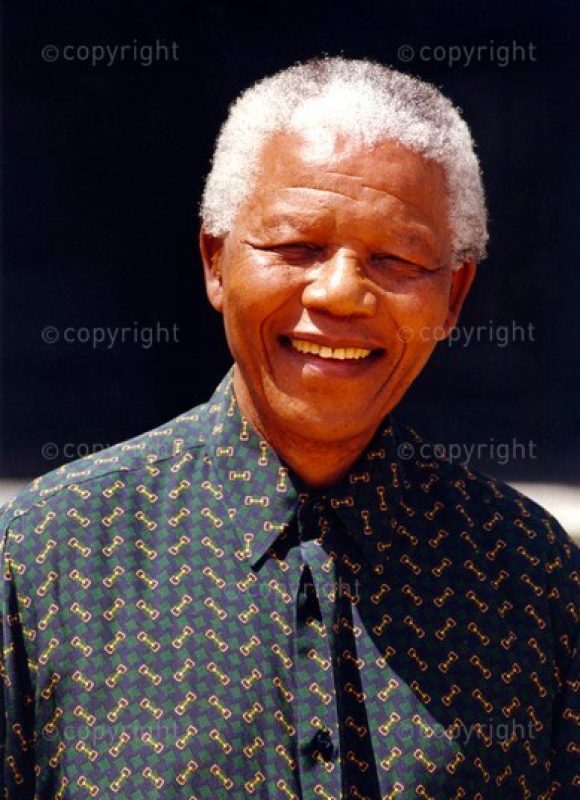PIONEER
Nelson Rolihlahla Mandela

Human rights activist | ANC President | President of South Africa
Born: 18 July 1918 Died: 5 December 2013
“[W]e stand today before our people and humanity to present this our new basic law of the land, whose founding principles of human dignity, non-racialism and non-sexism, and whose commitment to universal adult suffrage, regular elections and multi-party democracy are immutable. This is our national soul, our compact with one another as citizens, underpinned by our highest aspirations and our deepest apprehensions.”
Who is
Nelson Rolihlahla Mandela?
Lawyer, anti-apartheid activist and African National Congress (ANC) member, Nobel Peace Prize winner, and first elected President of a democratic South Africa.
Professions
and Roles
First democratically elected President of South Africa, long-time activist, and ANC member.
Best Known For
Being the first democratically elected President of South Africa. Signed the final Constitution, which became the supreme law of the land.
Life highlights
- Mandela joined the ANC in 1994 when he helped to form the ANC Youth League (ANCYL).
- Mandela was selected as the National Volunteer-in-Chief of the Defiance Campaign in 1952. Mandela and 19 others were charged under the Suppression of Communism Act for their part in the campaign, and sentenced to nine months of hard labour, suspended for two years.
- Mandela established South Africa’s first black law firm in 1952 with Oliver Tambo, called Mandela & Tambo.
- Mandela was arrested in a countrywide police swoop on 5 December 1955, which led to the 1956 Treason Trial. He was acquitted on 29 March 1961.
- Mandela asked to lead the armed struggle in 1961, and helped to establish Umkhonto weSizwe (MK), which launched on 16 December 1961 with a series of explosions.
- Mandela was arrested in a police roadblock in 1962, and charged with leaving the country without a permit and inciting workers to strike. He was convicted and sentenced to five years imprisonment.
- In 1963, the police raided Liliesleaf, a secret hideout used by the ANC and Communist Party activists. Mandela was put on trial for sabotage at what became known as the Rivonia Trial. He was convicted and sentenced to life imprisonment.
- While in prison, Mandela spent four months secretly writing his autobiography at night. The original manuscripts were wrapped in plastic cocoa containers and buried in the different sections of the prison garden. But in 1977, when prison authorities began building a wall to completely isolate B Section, they discovered the hidden manuscript.
- In the last months of his imprisonment in 1989, Mandela obtained an LLB degree through the University of South Africa.
- Mandela was released from prison on 11 February 1990, nine days after the unbanning of the ANC and the Pan Africanist Congress (PAC).
- Mandela was elected ANC President in 1991.
- Mandela won the Nobel Peace Prize together with President FW de Klerk in 1993. He was elected as President of the Democratic Republic of South Africa on 27 April 1994 – the first democratically elected President.
- Mandela established the Nelson Mandela Children’s Fund, the Nelson Mandela Foundation, and the Mandela Rhodes Foundation.
- On 10 November 2009, the United Nations General Assembly announced that Mandela’s birthday would henceforth be known as “Mandela Day”, marking his contribution to world freedom.
IN THEIR OWN WORDS
“The new Constitution obliges us to strive to improve the quality of life of the people. In this sense our national consensus recognises that there is nothing else that can justify the existence of government but to redress the centuries of unspeakable privation by striving to eliminate poverty, illiteracy, homelessness and disease.
The Constitutional Assembly reinvigorated civil society in a manner that no other process in recent times has done. Present today [8 May 1996] in the public gallery are representatives of almost every organised sector of civil society which made inputs into the process: the legal fraternity, women, local communities, traditional structures and leaders of sectors dealing with business, labour, land issues, the media, arts and culture, the youth, the disabled, children and wards, and many more.
This Constitution is our own humble contribution to democracy and the culture of human rights worldwide, and it is our pledge to humanity that nothing will steer us from this course.
In adopting this Constitution, we discussed our strategy very carefully, and the principle that we established was that there should be neither winners nor losers. South Africa as a whole must be the winner. ”
– Nelson Mandela
IN THE WORDS OF OTHERS
“On 10 December 1996, Nelson Mandela promulgated the Constitution of 1996 into law and the Bill of Rights, enshrined in the Constitution, became the cornerstone of the newly created democracy; the executive, legislative and judicial powers were bound by the Bill of Rights in the execution of their respective responsibilities.
In his opening address to Parliament, Nelson Mandela sought to give expression to the centrality of human dignity by demonstrating that, without the freedom from want and hunger, the dignity of the citizen would not be realised. In so doing, he gave content and meaning to the notion of human dignity and ensured that it straddled civil, political and socioeconomic rights.”
– Enver Surty, Deputy Minister of Basic Education
Parliament of the Republic of South Africa (2018) Theme Committee Book Series 1-6
